Picture this: your technician is double-booked, one customer calls for an urgent leak fix while another is waiting for a water heater install, and you're stuck on the phone trying to juggle schedules.
By evening:
- You’re chasing unpaid invoices
- Your best techs are burned out from constant rescheduling and overtime
This is the daily reality for many plumbing business owners. You're not just fixing leaks, you're running dispatch, tracking jobs, chasing invoices, and trying to keep customers happy. That's why plumbing job management software isn't a luxury anymore. It's the difference between chaos and control.
To help you find the best-fit software for your specific needs, this guide is structured differently.
Instead of throwing a random list at you, we’ll provide clear decision-making criteria and split the best plumbing job management software into three categories:
- Tools for growing teams scaling past spreadsheets
- Lighter apps for solo plumbers or small shops
- All-in-one platforms for complex, multi-crew operations
Here's a comparison table to help you scan quickly:
| Tool | Best For |
|---|---|
| Buildbite | Best for small to medium-sized plumbing businesses moving from paper-based processes to a mobile-first job management system. |
| Jobber | Best for small-to-mid plumbing businesses needing an all-in-one field service platform to streamline ops. |
| Housecall Pro | Small-to-midsize residential and light-commercial plumbing teams needing faster cash flow, simpler dispatch, and tighter customer communication. |
| FieldPulse | Growing businesses standardizing pricing for faster, more accurate field quoting and invoicing. |
| Fergus | Contractors handling multiple small jobs daily who need to automate administrative tasks. |
| Workiz | Dispatch-heavy teams needing a call center-style workflow with AI-powered automations. |
| FieldEdge | Long-established firms managing recurring customers and service agreements with rich history. |
| ServiceM8 | Solo plumbers needing a free, mobile-first solution to manage their first 30 jobs monthly. |
| Tradify | Owner-operators seeking a simple app to manage quotes, jobs, and paperwork from anywhere. |
| Workever | Small teams requiring a simple, real-time platform with offline access. |
| ServiceTitan | Larger firms managing fleets and detailed reporting. |
| BigChange | Enterprises handling multi-crew and complex billing. |
What makes a great plumbing job management software?
The best plumbing software aligns with your team size, workflow, and growth stage.
- Solo plumbers or small teams need mobile-first tools that replace paper and spreadsheets. Features like on-site quoting, instant invoicing, and offline access save hours by letting you manage jobs directly from a phone—even in basements or remote sites.
- Growing teams (5–50 technicians) benefit from a unified platform that centralizes scheduling, communication, and real-time job updates. This reduces missed jobs, double bookings, and administrative work to increase overall productivity.
- Enterprise-level firms require all-in-one systems with fleet management, job costing, and financial dashboards that turn a large volume of data into actionable decisions.
Let’s go through the solutions for each category in detail:
Starting to scale up? These tools help you keep jobs, technicians, and customers in sync
When plumbing businesses expand past two or three technicians, spreadsheets and text message chains collapse. Jobs start slipping, and "who was supposed to handle that drain inspection?" becomes an expensive question.
These tools are made for teams with 5 to 50 technicians that need real-time scheduling, mobile documentation, and customer tracking in one ecosystem.
1. Buildbite
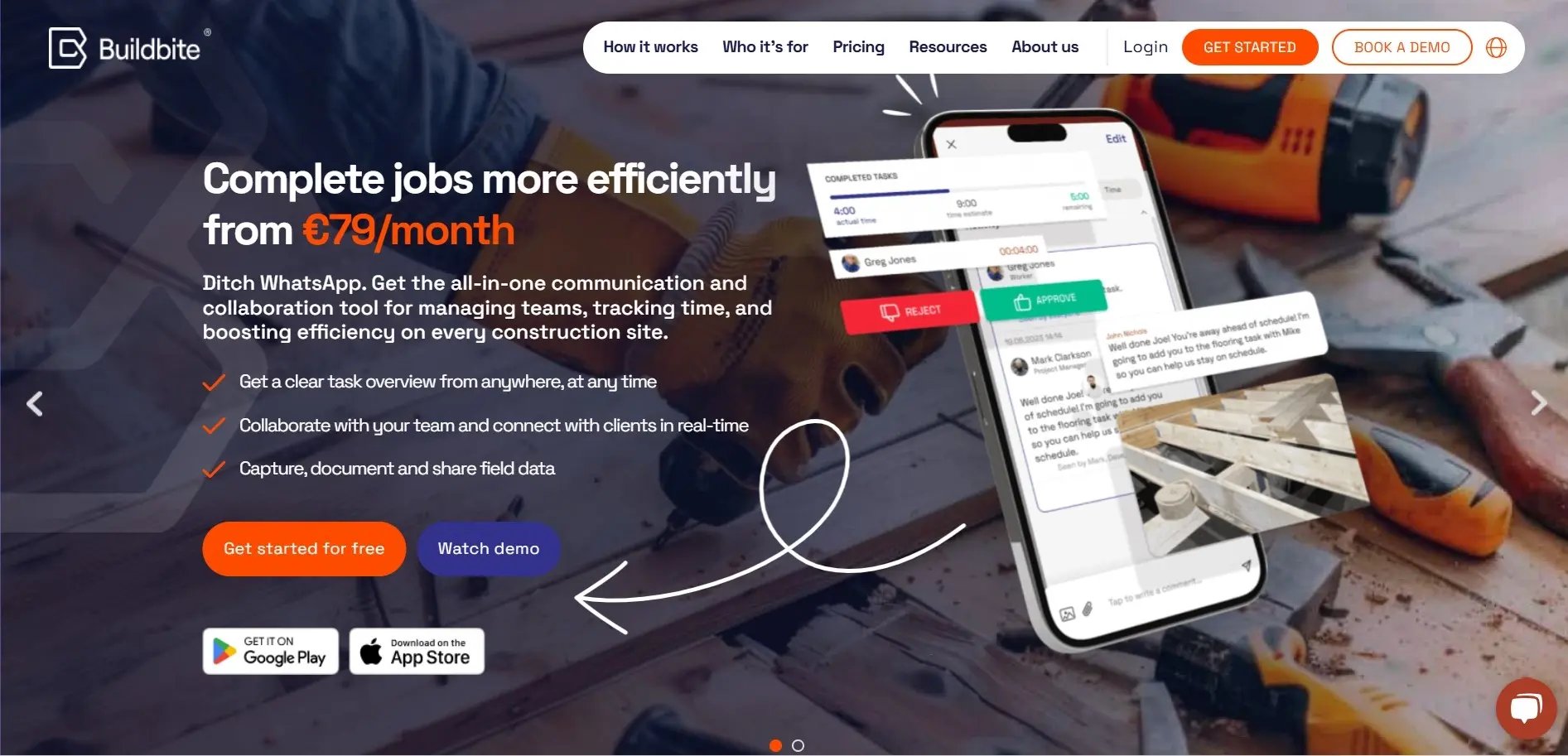
Best for: Best for small to medium-sized plumbing businesses moving from paper-based processes to a mobile-first job management system.
For plumbing businesses, Buildbite bridges the gap between scattered paper methods and complex office-first software.
Instead of juggling WhatsApp, spreadsheets, and endless notes, plumbers can manage jobs, communication, and documentation in one mobile-first app built for the field.
By capturing time, progress, and photos in real time, Buildbite helps plumbing businesses:
- reduce disputes to nearly zero
- increase invoice rates by 75%
- save teams an average of 2.5 hours per person each day
Here’s how Buildbite makes this happen for plumbing teams:
Unified job management
Buildbite replaces scattered spreadsheets and group chats with one mobile-first project hub.
- Create jobs and split them into clear phases
- Assign crews and attach plans, photos, and instructions
- Keep multiple sites and teams aligned
For plumbing businesses juggling several crews, this means fewer double-bookings, clearer responsibilities, and less time wasted on schedule firefighting.

Real-time documentation & billing proof
Every change order, photo, and time log links directly to its job—creating an auditable trail that owners can rely on.
The result:
- Faster approvals on change requests
- Fewer unpaid hours slipping through
- Invoices backed with clear, exportable evidence
This is especially powerful for mid-sized plumbing firms dealing with NET-60/90 terms, where missing proof can stall cash flow for months.

Scheduling, dispatch & integrated time tracking
Instead of juggling spreadsheets and calls, managers can schedule jobs by crew, skill, and location. Workers then see a personal “My Tasks” view sorted by date—making it clear what’s next.
Add in:
- GPS-based check-ins
- One-tap timers logging hours against tasks
…and payroll matches reality, not guesswork. That tightens margins, prevents under-reporting, and improves accuracy for future bids.

Built-in client collaboration that reduces calls
Clients expect updates without chasing. With Buildbite they can:
- Follow live progress
- Approve scope changes instantly
- Leave comments in the job stream
This eliminates the dreaded “I never got the email” argument, cuts down chaotic WhatsApp threads, and reduces constant calls to the office. The payoff? Happier clients, fewer interruptions for staff, and more repeat business.
Pros
- Mobile-first and field-ready: Built for plumbers to manage jobs directly from their phones, replacing office-heavy tools with a simple app designed for quick adoption on busy job sites.
- All-in-one simplicity: Instead of juggling WhatsApp, email, and spreadsheets, Buildbite centralizes tasks, communication, and documentation—reducing errors, admin work, and keeping every project detail in one place.
- ‘True’ real-time communication: In-app chat, images, and videos let teams share updates instantly from the field, helping plumbers make faster decisions and avoid costly miscommunication.
- Built for client involvement and transparency: Clients can track progress, communicate, and approve changes in the app, creating a digital paper trail that minimizes disputes and improves billing accuracy.
- Predictable, scalable pricing: Unlike competitors with per-user costs, Buildbite includes all features in every plan—so plumbing teams can grow without unexpected price hikes.
Cons
- Not designed for enterprise-scale projects, so larger plumbing contractors may outgrow it.
Pricing
| Plan | Monthly Cost | Annual Cost (per month) | Annual Savings | Users | Data Storage |
|---|---|---|---|---|---|
| Basic | $129 | $89 | 31% | Up to 5 | 1GB |
| Standard | $199 | $139 | 30% | Up to 20 | 3GB |
| Premium | $279 | $199 | 29% | Up to 50 | 7GB |
All tiers include a 14-day free trial with full features.
Reviews
"With Buildbite we build great customer relationships and we've increased our billing rate to 95%"
— Thomas Noreila, CEO, Trähus
👉 Learn more about Buildbite for plumbers
Simplify any job with Buildbite
Start your 14-day free trial today
2. Jobber
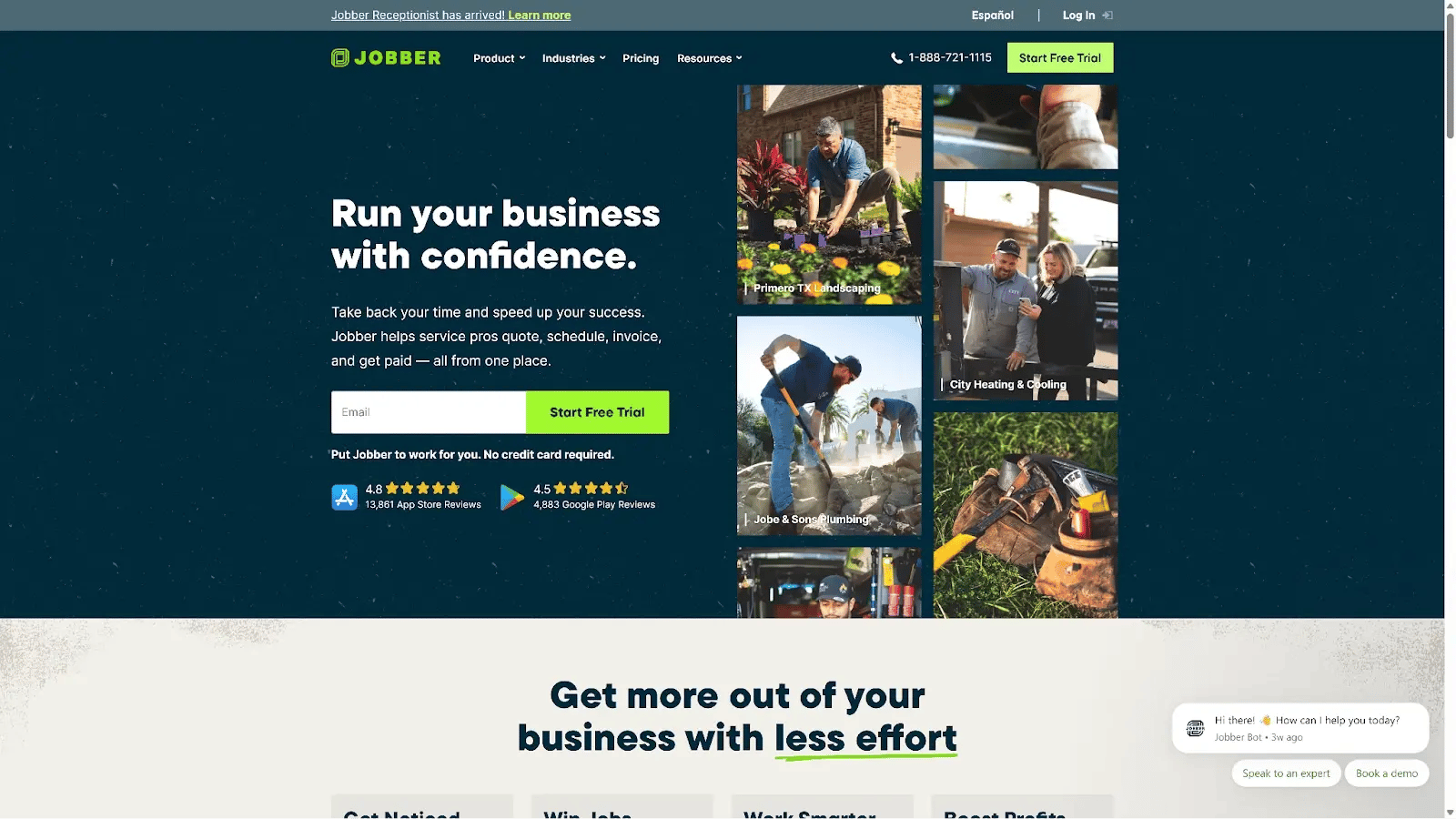
Best for: Best for small-to-mid plumbing businesses needing an all-in-one field service platform to streamline ops.
Jobber positions itself as a single platform to quote, schedule, invoice, and collect—reducing paperwork, speeding payments, and improving dispatch accuracy.
For plumbers, this means fewer missed appointments, faster cash flow via integrated payments, and clearer job histories that cut admin time and job-cost guesswork.
Key Features
- Automated invoicing & Jobber Payments: Generate branded invoices on job completion, accept card/ACH, and automate follow-ups—so technicians get paid faster and owners spend less time chasing late payments.
- Client Hub + two-way messaging: A customer portal for quote approvals, payments, and schedules plus SMS/threaded messages logged on the job—reduces incoming calls and keeps field and office teams aligned.
- Smart scheduling with routing: Drag-and-drop calendar plus automatic route optimization to minimize drive time—letting crews complete more billable jobs per day and cut fuel costs.
- GPS & time tracking for job costing: Clock-in/clock-out, GPS location on jobs, and timers provide precise labor data so owners can calculate per-job profitability and stop guessing on margins.
Pros
- Accelerates cash flow via integrated payments, ACH options, and instant payouts for quicker bank deposits
- Self-service client portal and automated invoice reminders free office time for revenue tasks
- Route planning and mobile job access let crews fit more jobs into the day
- GPS and detailed time logs reduce disputes and enable accurate job costing
- Automated review requests push satisfied customers to Google, building steady social proof
Cons
- Costs scale quickly: per-user fees and feature gating on higher tiers can make monthly spend rise as teams grow.
- Limited deep plumbing-specific workflows (e.g., native change-order flow) and some customization gaps for quotes/invoices.
- QuickBooks sync can require manual fixes and vigilance—some users report frequent reconciliation work.
- Mobile/reporting limits reported by users—some find the app restrictive for complex onsite documentation.
Pricing
Jobber uses tiered monthly or discounted annual subscriptions (Core → Connect → Grow), each including a number of users with additional users at a per-user fee (commonly $29/user).
Annual billing reduces the per-month price; a free trial is available. Higher tiers unlock GPS, online booking, job costing, and marketing tools.
Reviews
"We really like the workflow of Jobber... great updates... Some things we do not like are the inability to do a change order in the current job, the overall monthly cost of the platform, the Quickbook sync is insufferable..."
— (Zack P., small-business owner) - G2
👉 Compare Jobber alternatives
3. Housecall Pro
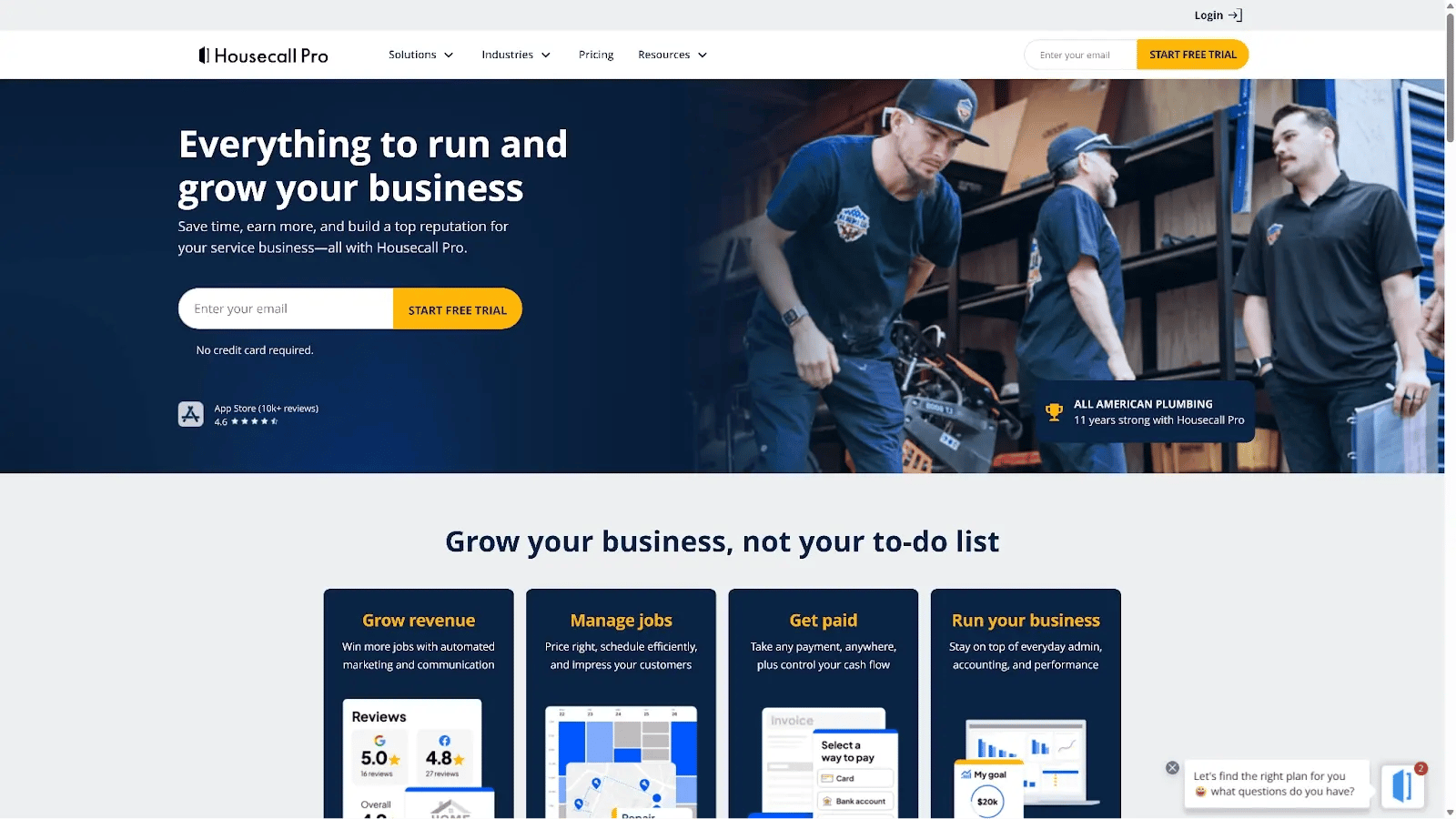
Best for: Small-to-midsize residential and light-commercial plumbing teams needing faster cash flow, simpler dispatch, and tighter customer communication.
Housecall Pro positions itself as an all-in-one field service platform that centralizes scheduling, quoting, payments, and customer communication so plumbers spend less time chasing work and more time on billable jobs.
It targets cash-flow and scheduling pain points common to trades.
Key Features
- Integrated payments & “card on file”: on-site card/ACH processing, card-on-file and instant-payout options so invoices convert to cash the same day—reduces AR days and frees capital for parts and payroll.
- Automated customer communication + AI answering: 24/7 call handling, “On my way” SMS with GPS, and appointment reminders that cut incoming calls and missed jobs while improving customer transparency.
- Drag-and-drop scheduling + real-time dispatch: visual calendar, tech availability and GPS updates let dispatchers assign nearest qualified tech fast, reducing downtime and manual calls.
- Visual price book & sales proposal tool (Profit Rhino integration): prebuilt flat-rate price book and photo proposals let techs present clear options on site and close higher-value jobs without guessing margins.
Pros
- On-site payments and card-on-file cut invoice lag, easing the NET-90/120 squeeze on small shops.
- AI answering and automations free staff from constant phone duty so they can focus on routing and growth.
- Automated ETAs, arrival texts and online portals reduce no-shows and negative reviews.
- Full iOS/Android app lets techs create estimates, collect payments, and attach photos from the field.
- Job costing and profitability reports let owners price and staff with fewer surprises.
Cons
- No native route optimizer: businesses needing automatic multi-stop route planning must buy an integration (adds cost and setup).
- Key features behind add-ons: price-book, GPS tracking and proposal tools are often paid extras—total cost can rise quickly.
- Web UI inconsistencies: some users report an older, clunky web interface that slows back-office workflows compared with the mobile app.
- Pricing scales per user: adding technicians can push monthly cost materially higher for growing teams.
Pricing
Housecall Pro uses tiered plans (Basic → Essentials → Max) with per-user pricing and paid add-ons.
- Official starting price appears from Housecall Pro as roughly $59/month (single user) for the entry tier, Essentials targets small teams and Max is custom-priced for larger operations.
- Popular add-ons include the Profit Rhino flat-rate price book ($149/month), vehicle GPS/dashcam tracking ($20/vehicle/month), and the Sales Proposal/Recurring Plans tools (~$40/month each).
Many add-ons are included only in the Max plan. A 14-day free trial is available. For exact current quotes contact Housecall Pro or view their pricing page.
Reviews
"Leads generate directly from multiple apps like Thumbtack, then easily transform into Estimates, Jobs when customers approve them, and invoices when the work is done. Great audit trail, automations to remind customers by email and text."
— Jacob K., Owner/Operator (organic G2 review).
👉 Compare Jobber vs Housecall Pro
4. FieldPulse
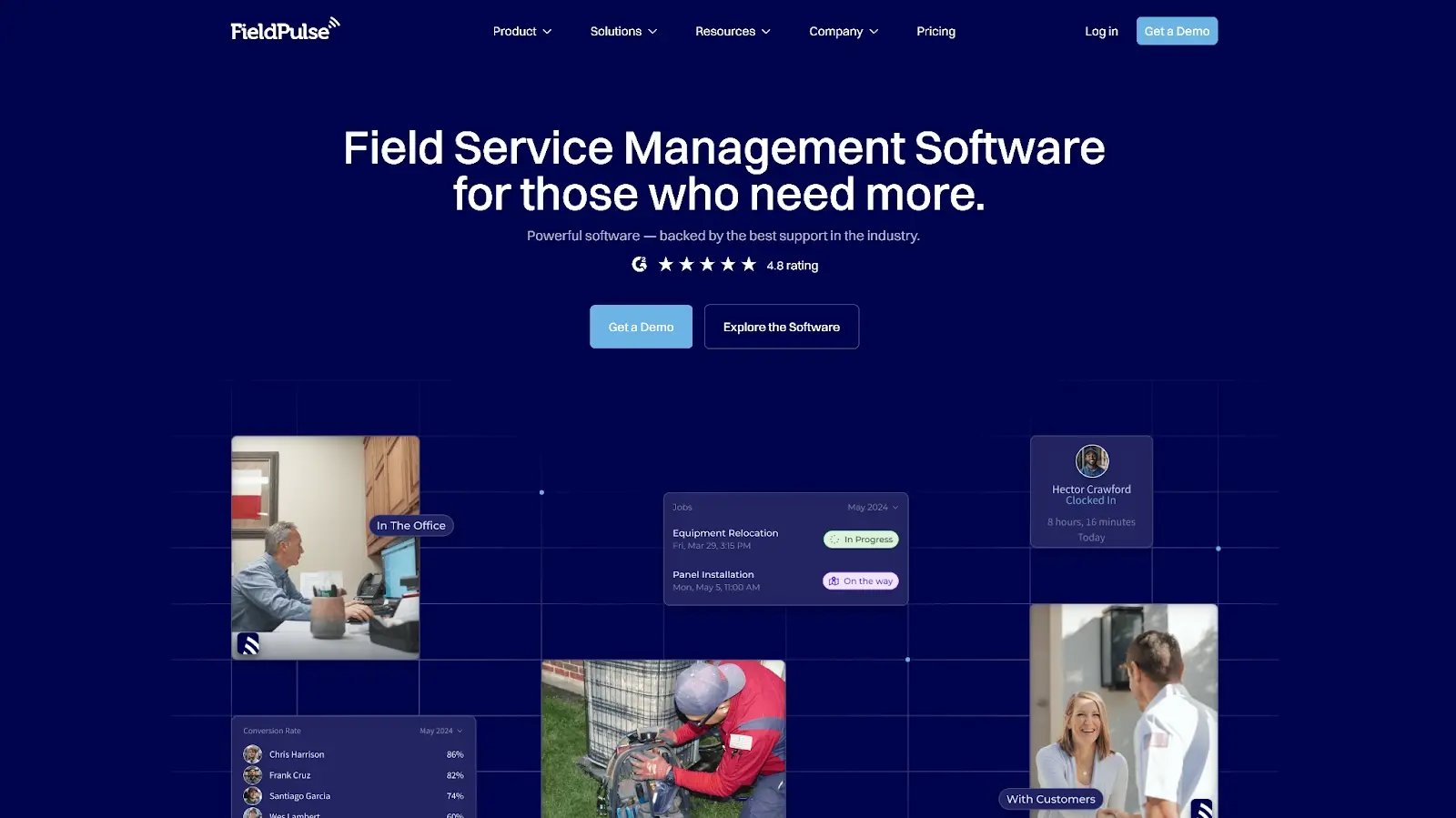
Best for: Small to medium-sized plumbing businesses looking to transition from a manual, paper-based process to a single, integrated digital platform.
FieldPulse centralizes scheduling, quoting, invoicing, and payments so plumbers stop firefighting and start running predictable, billable days.
Most importantly, it targets cash-flow (faster invoices/financing), customer communication (portal & automated updates), and labor efficiency (real-time dispatch and reporting) to remove daily operational bottlenecks.
Key Features
- Dynamic scheduling & dispatch: drag-and-drop calendar with real-time tech status and location so dispatchers assign the nearest available tech, cut travel time, and fit emergency jobs without double-booking. This increases billable hours per van.
- Customizable pricebook & on-site estimating: central flat-rate pricebook lets techs generate itemized, approved estimates on the phone or tablet, preventing undercharging and speeding customer approvals into invoices.
- One-click invoices + integrated payments (including financing): convert an approved estimate to invoice instantly and accept card/ACH or financing so businesses collect sooner and protect cash flow from NET-90/120 exposures.
- Customer portal & automated comms: clients can view appointments, approve proposals, and pay online; automated ETA, confirmation and follow-up messages reduce inbound calls and missed appointments.
Pros
- Instant invoice conversion and payments reduce AR days, freeing cash for parts and payroll.
- Automated notifications and a customer portal lower call volume and prevent missed messages.
- Visual map + tech status reduces drive time and last-minute juggling.
- FieldPulse’s implementation focus shortens ramp time for teams switching from spreadsheets.
- Job costing and KPI dashboards highlight unprofitable jobs and staffing gaps.
Cons
- Setup effort: deep customization requires time to configure — initial implementation can pull owners off billable work.
- Pricing opacity for top tiers: Professional/Enterprise costs require sales contact, making full budget planning harder.
- Industry-generic defaults: not plumbing-specific out of the box — you must tailor forms and workflows for trade nuances.
- Add-ons expand cost: features like fleet tracking or advanced suites may be separate purchases as needs grow.
Pricing
FieldPulse uses per-team tiers with annual discounts.
Public pricing:
- Basic — $79/month ($59/month billed annually) for solo pros (scheduling, invoicing, mobile payments).
- Essentials — $189/month ($149/month billed annually) for growing teams (QuickBooks sync, GPS, tech chat).
- Professional/Enterprise — custom pricing (Request Quote) for advanced features, voice/Engage, and dedicated support.
Additional paid add-ons (Fleet Tracking, Sales Suite, PDF form tools) are available. Exact costs depend on users and selected add-ons.
Reviews
"FieldPulse saves me hours of time a week and helps get rid of gaps or overlaps in our day-to-day operations."
— Rachel S., VP of Operations (G2 review).
5. Fergus
Best for: Small-to-mid plumbing businesses (1–50 staff) wanting faster cash flow, cleaner dispatch, and professional customer workflows.
Fergus is an end-to-end job management platform that replaces paper and spreadsheets with a single Job Card, visual scheduler, and integrated payments.
Fergus is known for accelerating billing with progress invoices and on-site payments while reducing admin via supplier and accounting integrations.
Key Features
- End-to-end Job Card + Job Phases: centralizes photos, notes, time and materials per job phase so you can issue progress invoices as work completes—improves cash flow and prevents lost costs between stages.
- Visual scheduling + GPS tracking: drag-and-drop calendar and live tech locations let dispatchers assign nearest available staff, cut drive time, and fit emergency jobs without double-booking.
- Automated quoting, invoicing & supplier sync: preload supplier prices into quotes, convert accepted estimates to invoices with one click, and auto-match supplier invoices to jobs to avoid missed costs.
- Mobile app + Fergus Pay: techs log time/materials, attach photos, and accept card or QR payments onsite, turning estimates into instant payments that shorten AR cycles.
Pros
- Onsite card/QR payments and progress invoices reduce days outstanding, freeing funds for parts and payroll.
- Supplier integrations and one-click invoice conversion eliminate duplicate data entry and manual reconciliations.
- Visual dispatch and GPS reduce travel waste so vans complete more profitable jobs daily.
- Job cards with photos and templated communications reduce disputes and negative reviews.
- Built-in reports expose unprofitable jobs and staffing bottlenecks for better hiring decisions.
Cons
- Limited inventory tracking: no robust vehicle-stock ledger means technicians can run out of parts, causing return visits and margin leakage.
- Implementation effort: full setup and customization take time, pulling owners from billable work during onboarding.
- Reporting/customization gaps: advanced P&L or bespoke job statuses may need workarounds or external reporting tools.
- UI quirks: some users cite navigation and missing month-view calendar as small but recurring friction points.
Pricing
Per-user monthly model with regional variants. Typical public pricing:
- Essentials ≈ $29/user/month
- Professional ≈ $41/user/month
- Enterprise (10+ users): custom quotes.
Additional options: Timesheet-only users from $20/month, Fergus Pay transaction fees (~2.95% + $0.30 USD), SMS credits ($15 per 100), and optional add-ons.
14-day free trial available; final cost depends on users and selected integrations.
Reviews
"What do you like best about Fergus? All information at your fingertips, its easy to keep track of jobs... Invoices go out faster and clients are happier because we look like we know what we're doing."
— Verified G2 user (construction industry)
6. Workiz
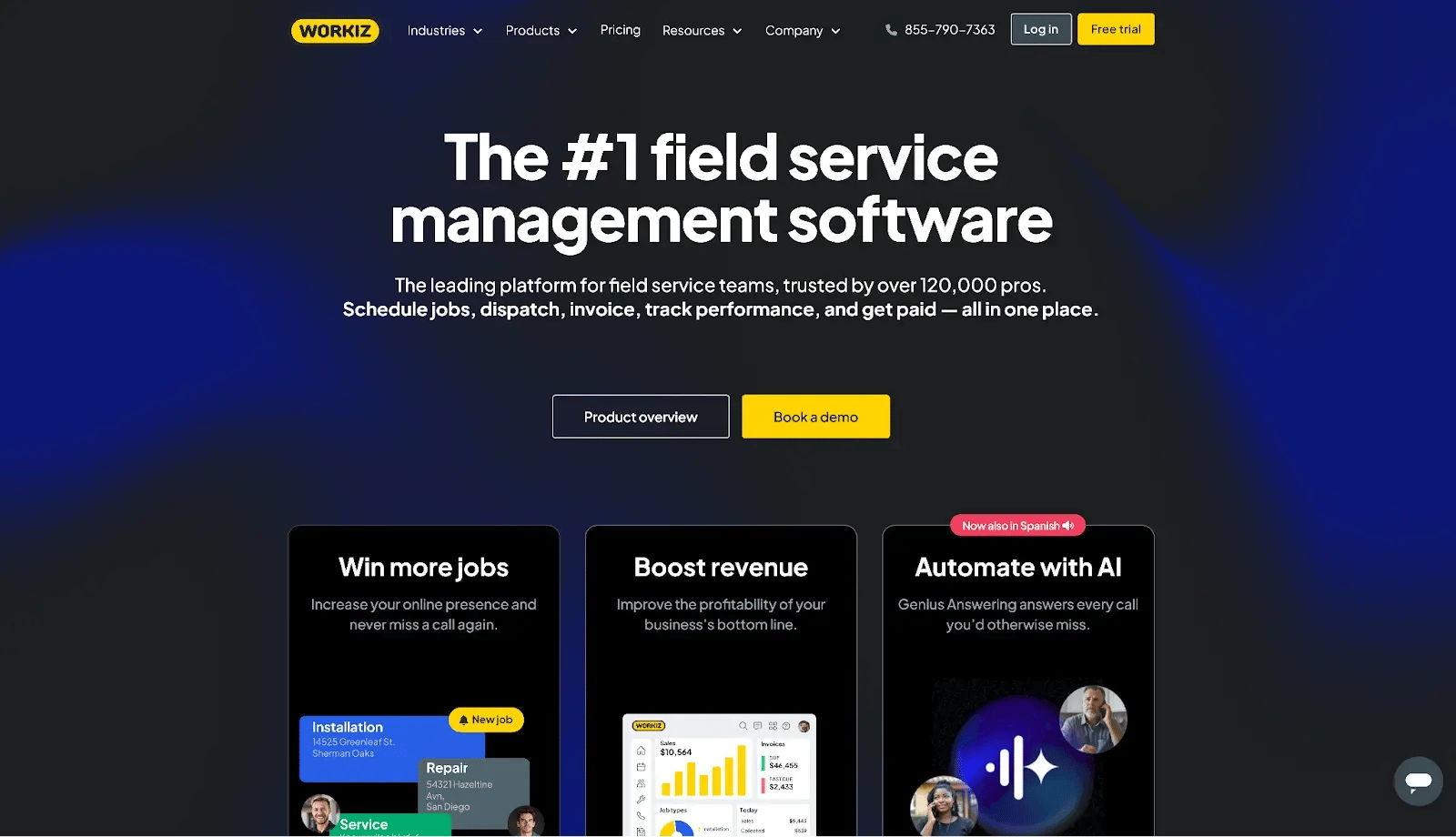
Best for: Dispatch-heavy teams needing call center-style workflows.
Workiz bundles AI call answering, scheduling, on-site payments, and automations into one field-service platform.
For plumbing businesses, it shortens days receivable with instant payouts and financing, reduces admin with Genius AI answering, and raises dispatch uptime via live GPS and smart scheduling.
Key Features
- Genius AI Answering: a 24/7 virtual dispatcher that answers calls, texts, and emails, books jobs, and pre-qualifies leads so office staff stop triaging missed calls and can focus on routing and billing.
- Workiz Pay (Instant payouts + financing): accepts card/ACH, offers instant payouts and consumer financing so completed jobs convert to usable cash the same day or the business receives funds upfront for large jobs.
- Advanced scheduling + GPS dispatch: drag-and-drop calendar with live technician locations and “on my way” notifications that reduce drive time, prevent double-books, and let dispatchers fill gaps quickly.
- Automations & service plans: recurring service agreements, automated reminders, and follow-ups that create predictable revenue, lower no-shows, and trigger invoices without manual effort.
Pros
- Cuts missed leads: AI answering captures after-hours calls and schedules jobs before competitors do.
- Live GPS plus map-based dispatch increases billable jobs per technician daily.
- Automations and Genius Answering lower the need for extra dispatch/reception staff.
- Mobile app, price book, and on-site payments let techs finish jobs and invoice immediately.
Cons
- Calls can show as “spam risk”: some Workiz Phone numbers may be flagged by carriers; remediation (CNAM registration) is required.
- Valuable features behind higher tiers: advanced AI automations and large automation quotas require upper plans.
- Dependence on phone number reputation: shared number pools can force extra setup to avoid blocked/flagged calls.
- Add-ons and user caps raise overall costs as teams grow. Watch per-user limits and extra seat fees.
Pricing
Tiered plans with per-team user caps:
- Lite (free, up to 2 users)
- Kickstart/Standard/Pro
- Standard ≈ $225/month for up to 5 users
- Pro ≈ $270/month.
- Ultimate/Enterprise requires contact for a custom quote.
- Standard ≈ $225/month for up to 5 users
Plans include a set number of users; additional seats and premium features (AI tools, extra automations, phone services) increase monthly cost. Check Workiz for current promos and exact seat pricing.
Reviews
"Workiz has improved team communication, reduced no-shows, and helped us provide faster service to our clients."
— Verified G2 reviewer (organic).
7. FieldEdge
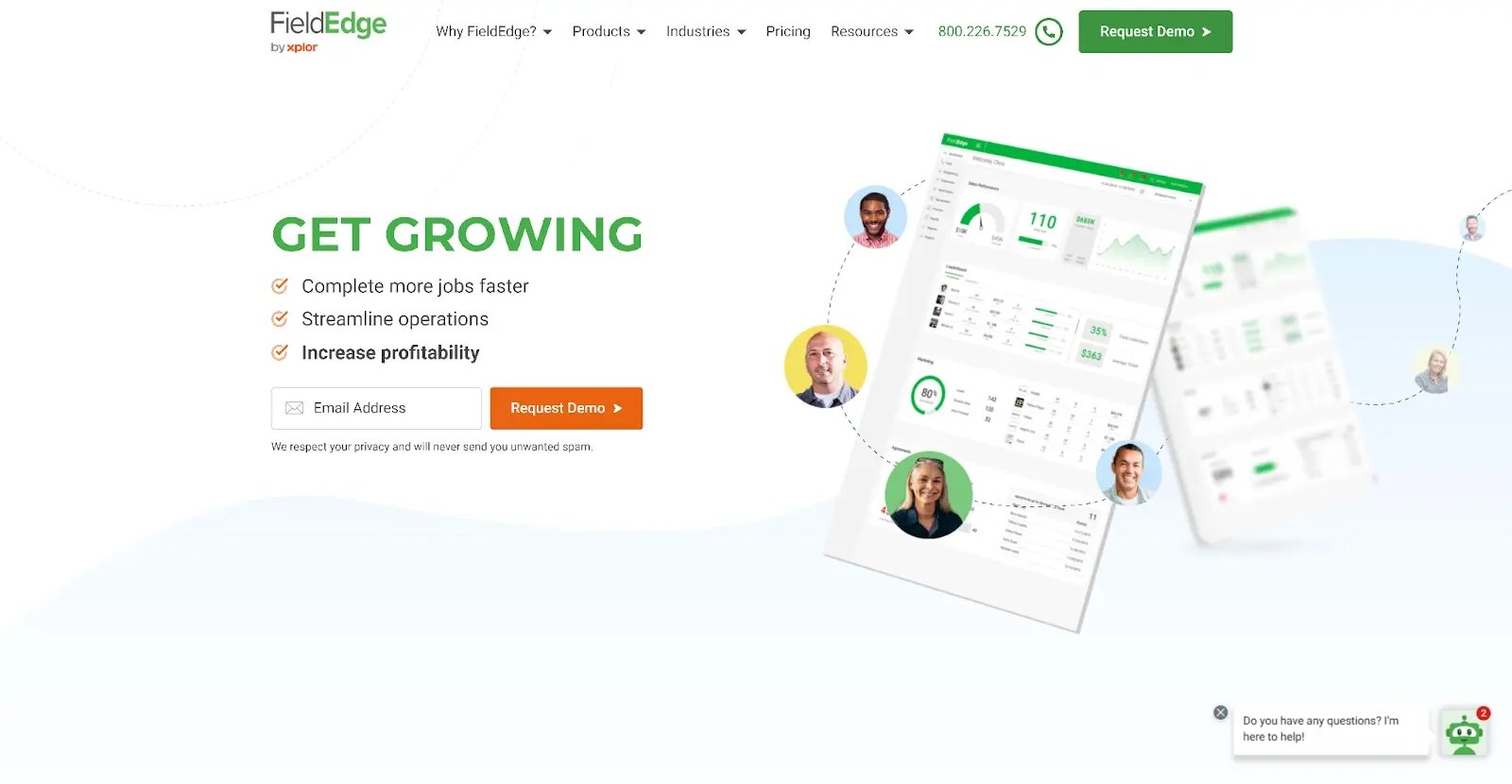
Best for: Mid-to-large plumbing businesses needing live QuickBooks sync, revenue tools, and stronger field control.
FieldEdge is a premium, all-in-one job management platform that links office accounting, dispatch, and field crews.
FieldEdge shortens payment cycles with live QuickBooks sync and on-site payments, while Proposal Pro and service agreements raise ticket value and create predictable recurring revenue for growing plumbing business owners.
Key Features
- Live QuickBooks sync + mobile payments: payments taken onsite post instantly to QuickBooks, removing batch reconciliation and showing real-time past-due balances. That visibility shortens AR days and lets owners buy parts or cover payroll without waiting weeks.
- Map-based dispatch with skill assignment: a drag-and-drop board assigns the nearest qualified tech by skill and location, with live status updates—reducing drive time, preventing double-books, and improving first-visit resolution so vans complete more billable work.
- Proposal Pro & service agreements: multi-option on-site quotes and automated renewal reminders let techs upsell transparently and convert service plans to recurring invoices, increasing average ticket value and stabilizing monthly revenue.
- Job Card + supplier integrations: a centralized job record stores photos, phases, and supplier invoices; auto-matching supplier bills to jobs enables progress invoicing and prevents missed material costs on multi-stage commercial work.
Pros
- Live sync and on-site payments reduce AR days so owners can plan payroll and parts purchases confidently.
- Proposal Pro’s tiered quoting increases upsells and average ticket without awkward field estimating.
- Map dispatch and live status cut travel and double-books, raising billable hours per van.
- Templated messages, automated reminders, and detailed job records reduce disputes and boost referrals.
- Profitability and technician metrics support smarter hiring and pricing decisions.
Cons
- High, opaque pricing: no published rates; quotes required. Estimated per-user costs near $100 (office) and $125 (field) monthly plus setup fees (~$500).
- Mobile usability gaps: technicians can’t easily view past work orders or daily history, adding field friction.
- No customer self-service portal: customers can’t self-manage bookings or invoices, increasing inbound calls for staff and affecting customer satisfaction.
- Variable onboarding: QuickBooks integration and support quality vary, causing inconsistent implementation experiences.
Pricing
FieldEdge uses custom-quoted tiers (Select, Premier, Elite). Pricing depends on feature set, number of users, and add-ons; third-party estimates place per-user costs around $100/month for office users and $125/month for field technicians, with one-time setup fees starting near $500.
Advanced modules (Proposal Pro, MarketingEdge, inventory) are add-ons.
Expect a demo and bespoke quote to get final pricing.
Reviews
"The benefits that we have found with FieldEdge are the communication with QuickBooks and our ability to red flag a customer that is a do-not-service. We have now been able to see in real-time past due balances, and the other benefit is our ability to create and accept quotes on both mobile and desktop versions. What I dislike is that the mobile portion of FieldEdge is good for our field techs to use, but lacks in ease of use for work orders and creating new work orders. There is really no way to look at a previous work order history, or view work orders completed that day on the mobile platform."
— Verified G2 reviewer (plumbing professional).
Small shop, big workload? These apps help you stay organized without the extra fuss
Solo plumbers and small teams need efficiency without complexity. These tools focus on core functions like job scheduling, basic invoicing, and customer communication.
They're designed for quick adoption and immediate results.
8. ServiceM8
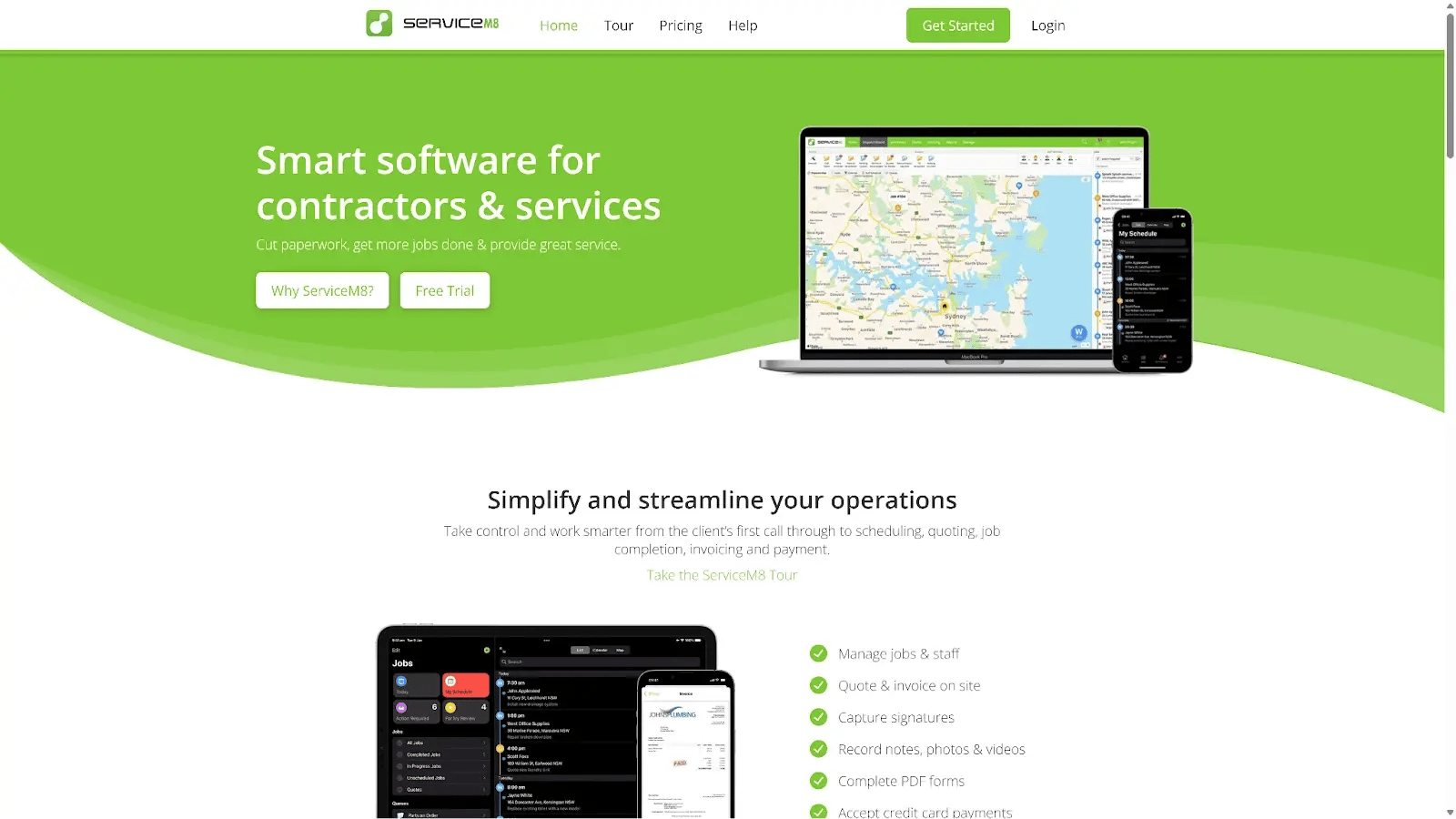
Best for: Small iOS-focused plumbing teams and solo operators needing fast payments and paperless workflows.
ServiceM8 is a mobile-first job management app that replaces paper tickets with on-site quotes, instant invoicing, and automated customer updates.
It speeds cash collection with payment links and QR/card processing while cutting admin through electronic forms, live dispatch, and job histories.
Key Features
- On-site quoting, Bundles & Live Statements: build branded estimates from pre-made Bundles, capture customer acceptance, and send live statements that update as invoices clear—turning field approvals into immediate invoices and shortening AR cycles.
- Automated client communication & Track My Arrival: automated booking confirmations, ETA texts with live map links, and two-way SMS reduce status calls so staff focus on dispatch and techs finish more jobs.
- Real-time dispatch map & Job History: drag-and-drop dispatch with color-coded statuses plus photos, notes, and checklists lets any tech pick up work quickly, reducing double-books and cutting windshield time.
- Electronic forms, certificates & accounting sync: customizable on-site forms create PDFs and sync to Xero/QuickBooks, so materials, timesheets, and invoices flow directly into job costing without manual reconciliation.
Pros
- On-site card/QR payments and Live Statements convert approvals into cash faster, easing payroll and parts purchasing.
- Automated invoices, PDFs, and job cards remove end-of-day paperwork, reclaiming staff hours for billing and dispatch.
- ETA texts and live-tracking give customers visibility, reducing missed appointments and status calls.
- Job photos, checklists, and timestamps prove completed work and clear up billing questions.
- Jobs-based pricing lets you add technicians without immediate per-user software costs.
Cons
- iOS-first limitations: the richest features are on iPhone/iPad; Android users get a reduced experience, creating friction for mixed-device teams.
- No daily route optimizer: lacks a built-in algorithmic route planner for ad-hoc, multi-stop days—dispatchers still manually sequence jobs.
- Support and scalability caveats: some high-volume users report slowdowns and limited phone support, which can bottleneck fast-growing field operations.
Pricing
Jobs-based pricing (not per-user):
- Free plan for solo operators (≈30 jobs/month).
- Paid tiers:
- Starter ~$29/month (50 jobs),
- Growing ~$79/month (150 jobs),
- Premium ~$149/month (500 jobs),
- Premium Plus ~$349/month (1500+ jobs).
- Starter ~$29/month (50 jobs),
All paid plans include unlimited users; extra jobs are billed per-use (≈$0.20/job). SMS, phone system, and some add-ons cost extra. 14-day free trial available.
Reviews
"ServiceM8 is a powerful tool for managing my field service operations… Invoices go out faster and clients are happier because we look like we know what we're doing."
— Acrobillus A., Verified G2 reviewer (G2).
9. Tradify
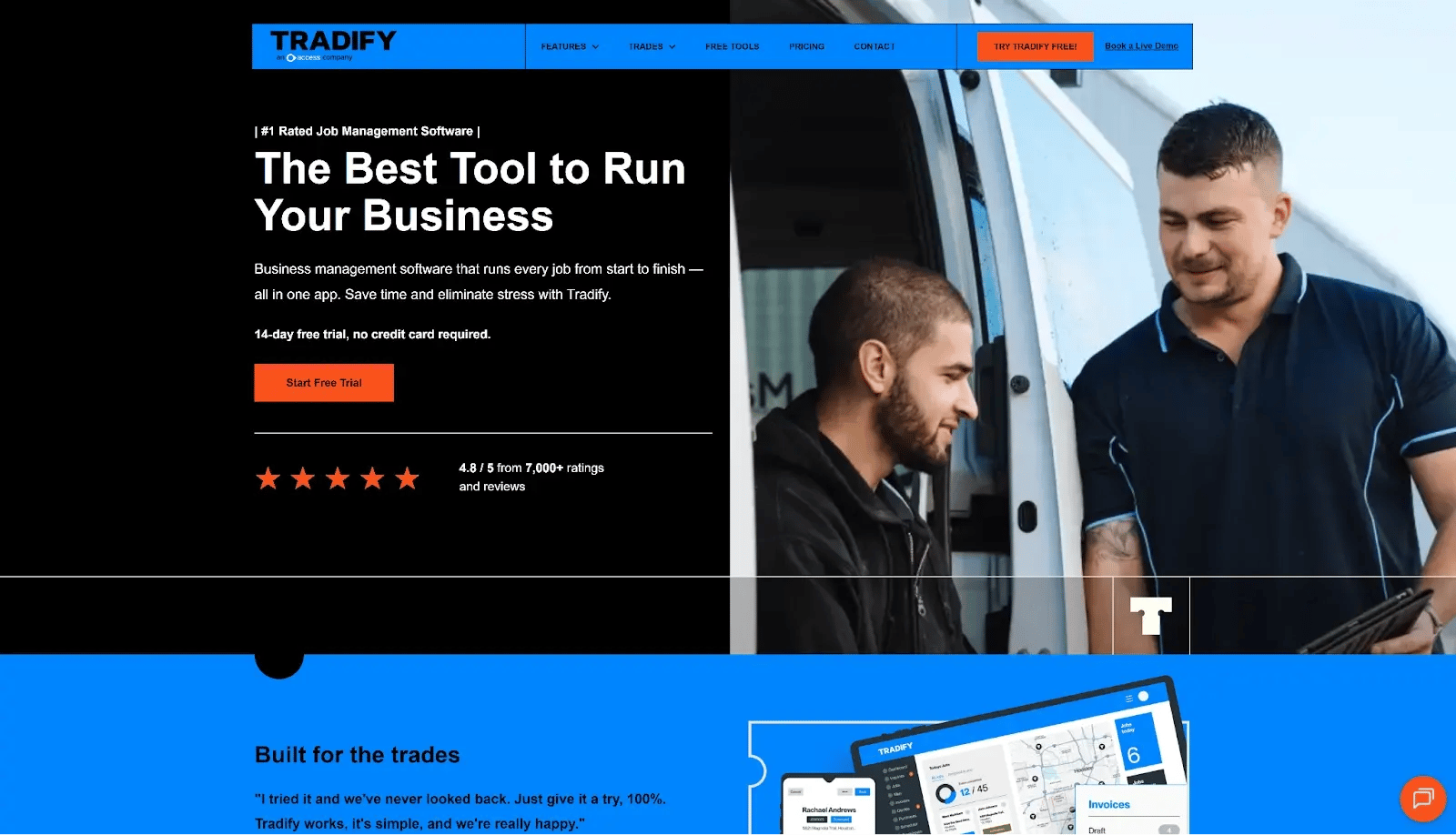
Best for: Owner-operators handling quotes and simple jobs.
Tradify is a mobile-first job management platform that replaces paperwork with smart quoting, automated customer updates, and real-time job tracking.
Tradify help plumbing businesses turn on-site approvals into invoices that directly syncs to accounting so owners can stop chasing payments and start focus on business-critical tasks, such as planning purchases, hires, and growth.
Key Features
- Smart quoting, invoicing & on-site payments: pull items from price lists, send branded quotes from the van, then convert approvals to invoices and accept card payments—shortens billing lag and reduces disputed charges by recording accepted items and prices immediately.
- Automated communication & customer history: email/SMS reminders, ETA texts and a centralized communications log reduce incoming status calls and keep customers informed, lowering no-shows and complaint-driven rework.
- Dynamic scheduling & real-time tracking: visual drag-and-drop scheduler with live job status and Google Calendar sync lets dispatchers assign the nearest available tech, cutting travel time and preventing double-bookings.
- Integrated timesheets, supplier sync & accounting: technicians log time/materials on-site; supplier costs import and sync to Xero/QuickBooks, enabling progress invoicing and accurate job profitability reporting.
Pros
- Instant invoices plus online card payments reduce days outstanding, freeing cash for parts and payroll.
- Mobile quoting, PDFs and supplier sync remove end-of-day paperwork, reclaiming staff time for billable work
- Live tracking and visual scheduling increase billable jobs per van each day.
- Branded quotes, digital certificates, and job photos lower disputes and boost repeat business.
- Dedicated support and clear docs help small teams get running quickly.
Cons
- Limited offline features: some functions require connectivity, which frustrates techs working in basements or remote areas.
- Per-user costs add up: per-user monthly pricing can grow costly as teams expand compared with job-based alternatives.
- Depends on external accounting: full financial workflow needs Xero/QuickBooks subscriptions—adds to total software spend.
- Reporting limits for complex needs: highly bespoke P&L or advanced analytics may need external reporting tools.
Pricing
Per-user monthly pricing (no long-term lock-in). Official tiers:
- Lite $47/user/month (basic job management)
- Pro $51/user/month (full features like progress invoicing)
- Plus $61/user/month (advanced tools)
Custom plans available for larger teams. 14-day free trial included. Note: discounts or negotiated rates may apply for larger teams; total cost equals per-user fees plus any accounting or supplier integrations.
Reviews
"One of the features I liked early on was how quickly you can send out quotes and... Invoices go out faster and clients are happier."
— Furry P., Verified G2 reviewer.
10. Workever
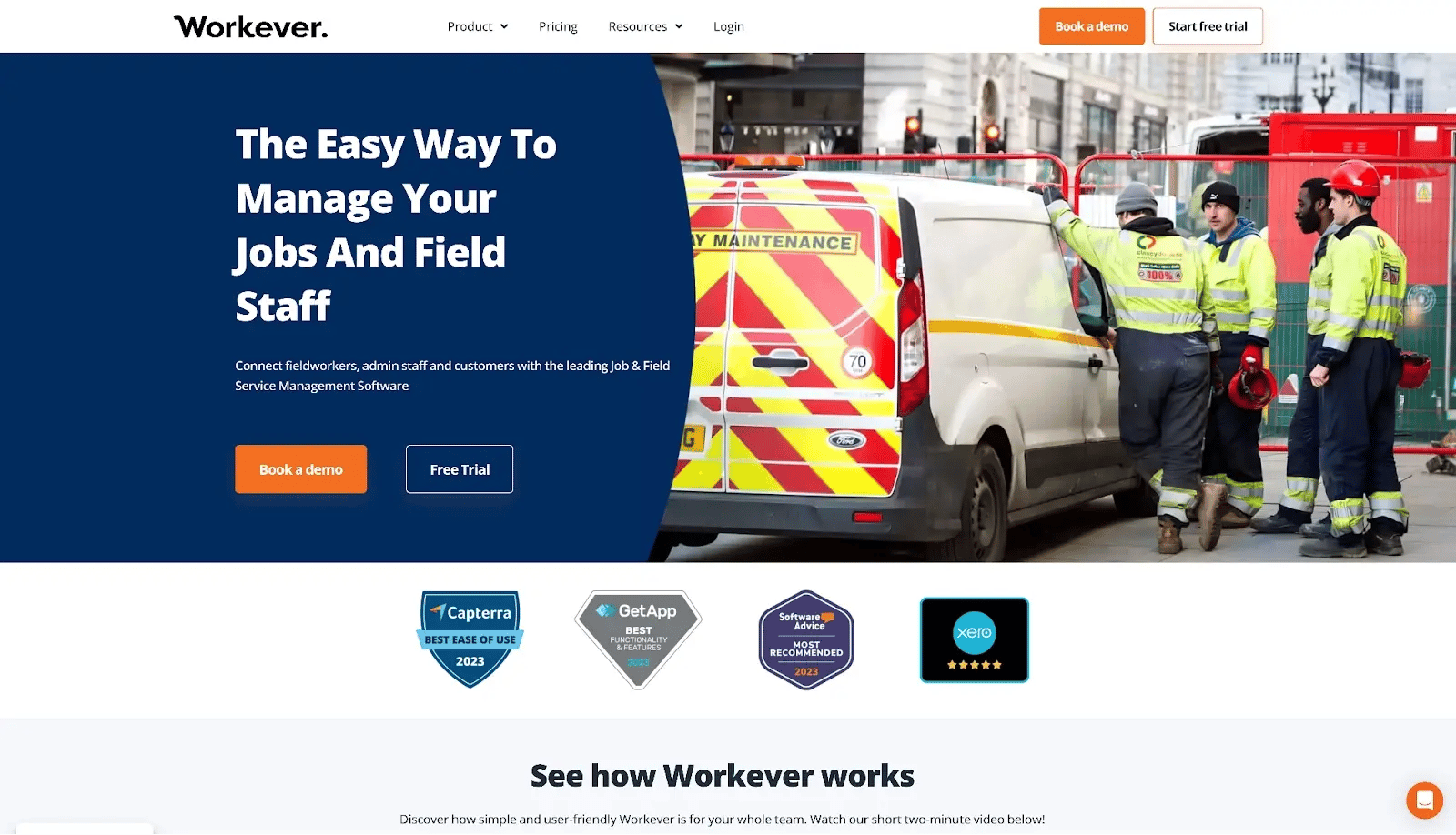
Best for: Small-to-medium plumbing teams (3–50 staff) needing paperless workflows and faster cash flow.
Workever is a mobile-first job management platform that replaces paperwork with automated quoting, real-time scheduling, and a customer portal.
Most importantly, it shortens billing cycles with one-click invoices and instant online payments while keeping field teams productive offline—helping reduce admin, missed appointments, and cash-flow stress.
Key Features
- Automated quoting → one-click job conversion & batch invoicing: build branded quotes from price lists, capture customer signature and photos on-site, then convert to an invoice instantly. That eliminates days of back-office entry and speeds payment requests into customers’ inboxes.
- Real-time scheduling & GPS dispatch: drag-and-drop calendar, live tech locations and recurring-job handling let dispatchers assign the closest qualified plumber, reducing drive time and enabling fast emergency response.
- Customer portal + automated comms: clients approve quotes, view job progress, and pay online; automatic ETA, confirmation and follow-up messages cut status calls and lower no-shows.
- Offline-capable mobile app: full job access (forms, photos, signatures, time tracking) without connectivity; all records auto-sync when online, preventing lost paperwork from basements or rural sites.
Pros
- Instant invoices and online payments reduce days outstanding so owners can buy plumbing parts and meet payroll.
- On-site quoting, auto-invoicing and supplier sync remove end-of-day paperwork and duplicate entry.
- Live dispatch and nearest-tech assignments shrink windshield time and increase daily profitable jobs.
- Simple UI and 30-day trial shorten ramp for crews with limited tech experience.
Cons
- Public pricing inconsistencies: listed plans vary across sources, so quoting and budgeting may require a sales call.
- Limited independent plumbing reviews: few G2 reviews from plumbers, forcing reliance on partner or general trade testimonials.
- No public API: integration options are limited for custom workflows or proprietary systems.
- Occasional performance lag: some users report slow page updates during high activity, which can hinder fast dispatching.
Pricing
Per-user monthly pricing (no long lock-in). Typical public rates:
- Base: £29/user/month (core job, scheduling, invoicing, mobile app)
- Ultimate: £39/user/month (forms, stock, service contracts, portal)
Annual billing and volume discounts may apply. Workever offers a 30-day free trial; final cost depends on users and add-ons—confirm current pricing with Workever.
Reviews
"Great user-friendly system and easy to use. … Workever is very easy to learn and use, the system is great to navigate and looks good."
— Lucy W., Administrator and Operations Assistant, G2.
Lots of moving parts? These tools can handle it all
Larger plumbing operations with multiple crews, complex billing, and detailed reporting needs require enterprise-grade solutions.
These platforms handle everything from fleet management to detailed analytics.
11. ServiceTitan
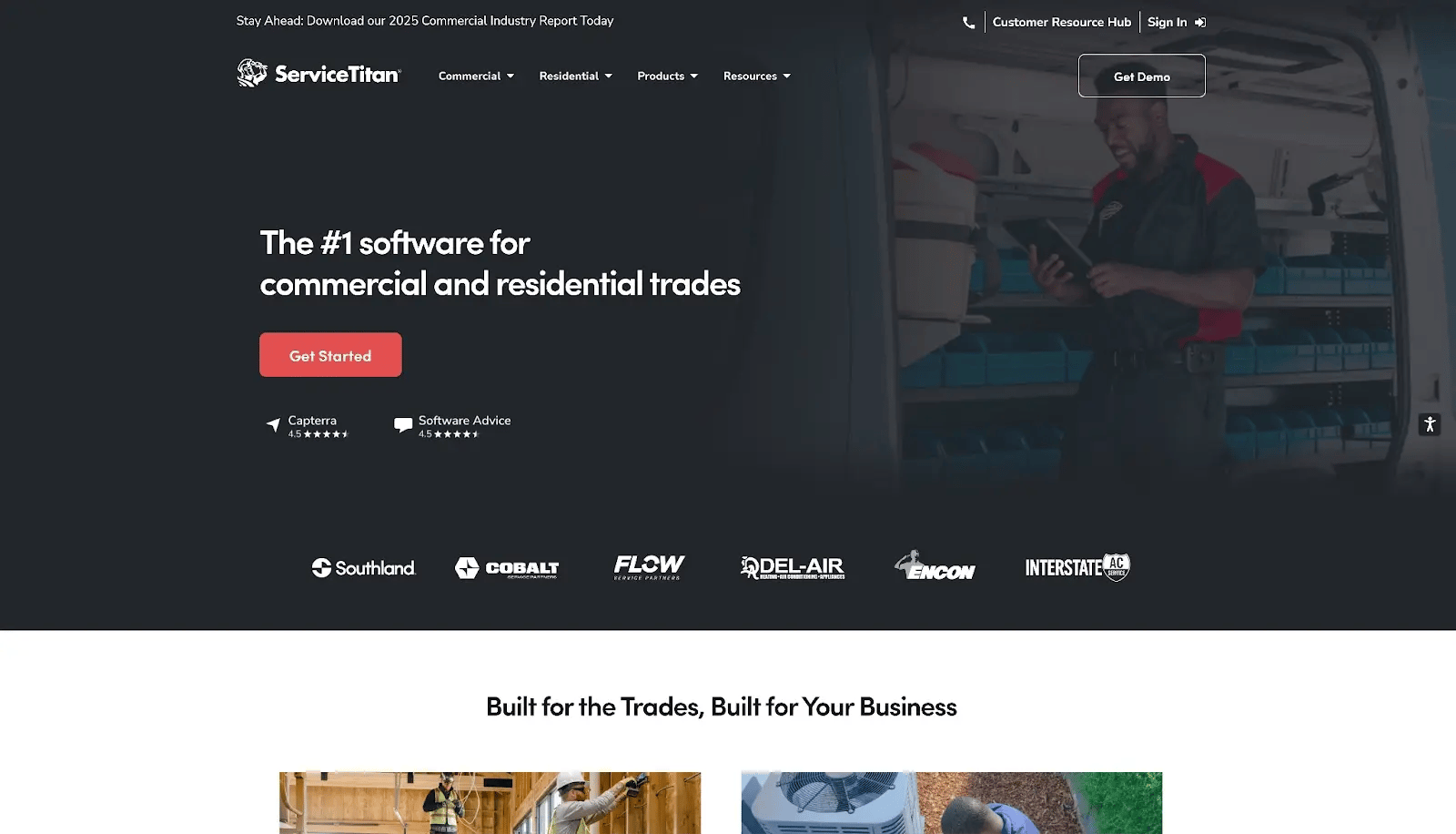
Best for: Medium to large plumbing businesses investing in growth and dedicated administrative teams.
ServiceTitan is a heavyweight, all-in-one operating system that centralizes dispatch, proposals, payments, and accounting.
The comprehensive set of features help shorten billing cycles by enabling in-field proposals and payments, automates customer updates to cut inbound calls, and provides live job-costing dashboards so owners spot unprofitable work and act fast.
Key Features
- Integrated pricebook & in-field proposals: technicians present multi-option, flat-rate quotes on tablets; prices auto-populate invoices and payroll, so quotes stay profitable and you avoid manual re-pricing after material swings.
- Intelligent dispatch + GPS tracking: a live dispatch board shows tech location, status and skills; dispatchers assign closest qualified techs to reduce drive time and increase first-visit resolution.
- Real-time job costing & reporting: job budgets update as materials and hours are logged, giving owners immediate visibility into margins and enabling corrective action before a job bleeds profit.
- In-field payments & recurring billing: accept cards or send secure payment links from the truck; automate recurring invoices for service plans to stabilize monthly revenue and reduce AR risk.
Pros
- On-site payments and smart invoicing cut receivable days, freeing cash for parts and payroll
- Automated customer messages and tracking links lower “where is my tech?” calls
- Multi-option proposals encourage upsells without pressuring customers
- Integrated modules replace multiple apps, simplifying multi-location control
- Live dashboards highlight unprofitable jobs and staffing gaps immediately
Cons
- High and opaque cost: pricing requires a demo; total cost often exceeds smaller alternatives.
- Heavy onboarding: full implementation can be lengthy and needs dedicated staff time.
- Overbuilt for small teams: many features go unused for companies under ~10 technicians.
- Support variability: some users report slow responses during urgent field issues.
Pricing
ServiceTitan uses custom, quote-based pricing (no public price list).
Costs typically scale per user and selected modules; businesses report monthly ranges from roughly $125/user up to several thousand dollars for enterprise deployments.
Expect a one-time onboarding/setup fee (often $1,000–$3,000+) and a tailored demo to receive an exact quote.
No free trial is offered.
Reviews
"ServiceTitan's dispatching function is the biggest, coolest thing about it. We're really big on getting the right guy to the right job and its tough to do without the right tools. That wouldn't be possible without ServiceTitan."
— Eric Falconer, GM, Dutton Plumbing & Rooter (G2).
12. BigChange
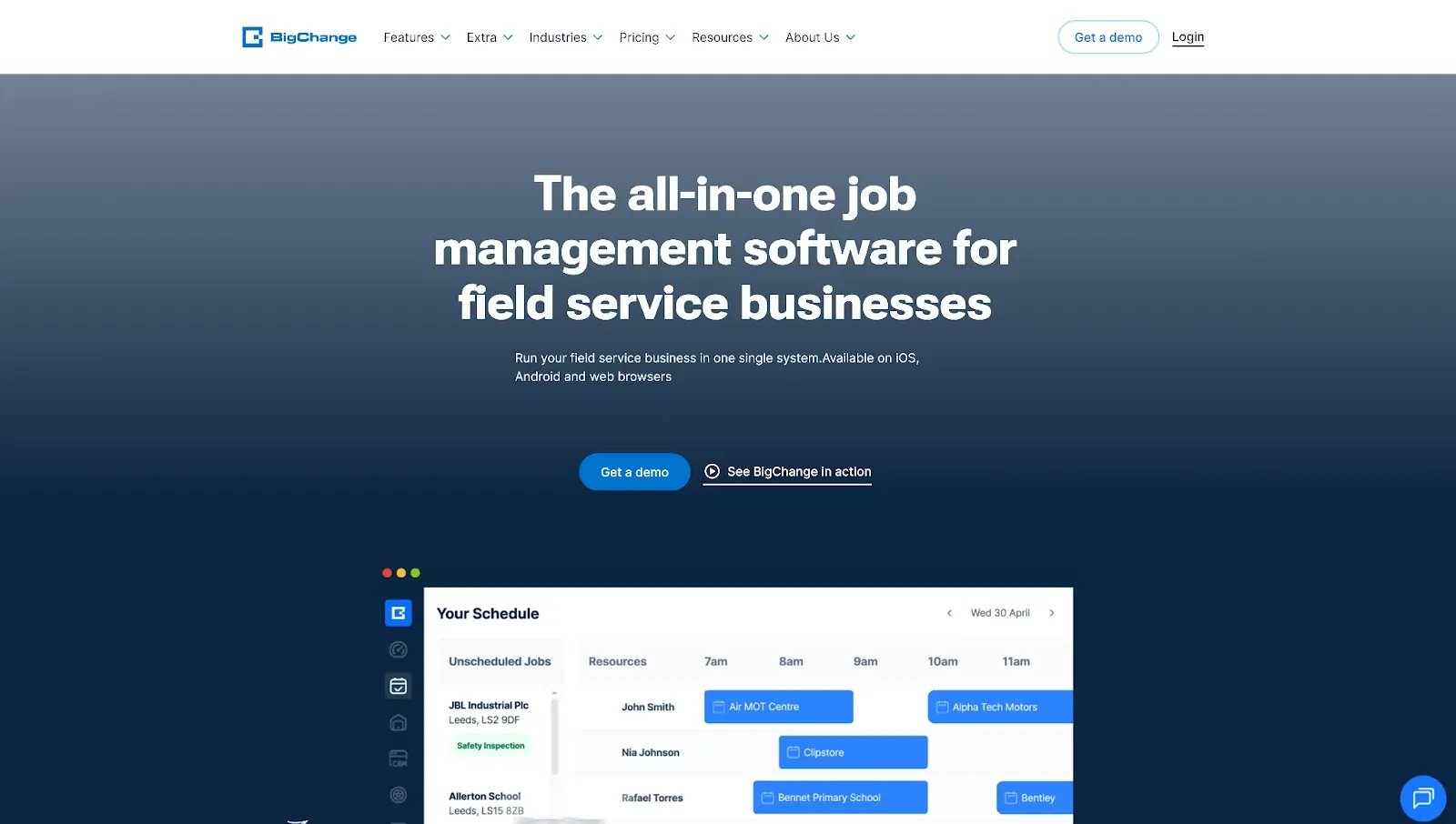
Best for: Best for larger plumbing businesses looking to replace multiple disconnected systems with one all-in-one platform.
BigChange positions itself as a field service management platform that unifies scheduling, invoicing, CRM, and fleet tracking in a single system.
For plumbing companies juggling fragmented tools, this integration eliminates manual data transfers, accelerates payments, and reduces customer communication gaps—all while improving cash flow and service efficiency.
Key Features
- Intelligent Scheduling and Live Tracking: Matches jobs to the right technician based on skills, location, and traffic. Live updates allow quick rescheduling if delays occur, reducing downtime and customer frustration.
- Digital Invoicing and Payments: Technicians capture proof of work and send invoices instantly from the app. BigChange Pay enables on-site card payments, shrinking payment cycles from weeks to minutes.
- Customer Portal and CRM: A 360° customer view centralizes service history, contracts, and communication. Clients can book jobs, track progress in real time, and access invoices without calling the office.
- Mobile App and Paperless Workflows: Technicians manage jobs, timesheets, risk assessments, and compliance certificates (e.g., gas safety) digitally—removing paperwork and ensuring accurate, standardized data capture.
Pros
- Proof of work, invoicing, and on-site payments cut the payment window from months to minutes.
- Automated booking confirmations, ETA alerts, and the portal reduce constant “where’s my plumber?” phone calls.
- Intelligent job scheduling and live tracking shorten travel time, enabling more billable hours and faster emergency response.
- Tracks planned vs. actual job times and digital timesheets to reveal inefficiencies and optimize technician productivity.
- Digital risk assessments and gas safety certificates (CP12, CP6) are auto-generated, reducing errors and liability.
Cons
- Harder to train new staff: Users report the system feels “clunky and outdated,” slowing onboarding and everyday navigation.
- Expensive long-term commitment: Multi-year contracts and high setup fees for quoting documents create financial risk for smaller plumbing firms.
- Manual accounting workaround: No integration with Sage Cloud means staff must export and re-upload financial data, adding admin work.
Pricing
- JourneyWatch: £14.95 per vehicle per month (vehicle tracking only)
- JobWatch (Most Popular): £79.95 per office or mobile user per month (complete job management, including CRM, scheduling, invoicing, and fleet tracking)
- JobWatchPlus: JobWatch plan cost + hardware fee (everything in the JobWatch plan, plus a fully managed, rugged Samsung tablet for each user)
Plans require multi-year contracts, with additional costs for setup and hardware under the JobWatchPlus option.
Reviews
"Bigchange has completely eliminated the need for paper, which has made us much more efficient in managing our technicians' days. But the interface feels clunky and outdated, and the lack of Sage Cloud integration is frustrating."
— Dave, Facilities Services, G2,
5 things you should look for in a plumbing job management software
- Unified job hub — Keep photos, change orders, permits, and notes on one job file so invoices attach evidence and disputes close without calls or rework.
- Smart scheduling & GPS dispatch — Automatically assign the nearest qualified tech and reduce drive time, letting crews complete more paid jobs each shift.
- On-site invoicing + integrated payments — Create the invoice at job completion and accept card/ACH on the spot so payments post days or weeks sooner.
- Client-facing updates & approvals — Automated ETA texts, progress messages, and instant scope approvals to cut incoming calls and stop scope-creep before it turns into lost time.
- Job costing & live profitability — Compare logged hours and materials to estimates in real time so you stop repeating unprofitable work and price future jobs correctly.
Most importantly, choose a system that implements these five in ways that match your team size and daily routines.
What are the benefits of plumbing job management software?
Faster cash flow: On-site invoicing plus integrated payments converts completed jobs into usable cash the same day, freeing funds for parts and payroll.
More billable hours: GPS-aware dispatch and route-aware scheduling shave drive time and idle gaps, so technicians finish more paying jobs without longer shifts.
Fewer lost invoices and disputes: Photo logs, signed change orders, and timestamped notes make approval decisions immediate and reduce unpaid or underpaid work.
Even more, these outcomes compound: quicker payments keep crews supplied, higher job throughput raises revenue per tech, and stronger documentation protects margins—so your software pays for itself in both time and money.
So, what is the best plumbing job management software?
There's no universal winner. Buildbite is best for mid-sized plumbing companies managing real-time documentation and client approvals. Jobber remains the easiest all-in-one starter for small shops.
Housecall Pro shines for teams adding payment processing. Enterprise-level firms will get the details needed from ServiceTitan.
The best choice is the one that fits your scale today, but can still grow as your crews, jobs, and admin needs multiply.
FAQs
What exactly is plumbing job management software?
It's software that centralizes scheduling, dispatch, invoicing, documentation, and client communication. It ensures jobs run without double-bookings, unbilled hours, or miscommunication.
How much does plumbing job management software cost?
Entry tools like ServiceM8 start at $29/month. Mid-market tools like Jobber range between $69 to $199/month. Enterprise platforms like ServiceTitan price per seat with annual contracts, often running $10K to $20K yearly.
What CRM do plumbers use?
Most plumbers lean on trades-focused CRMs inside job management software like Jobber or Housecall Pro. Larger companies may integrate with Salesforce, but small to mid-sized plumbers prefer field service software/ CRMs with invoicing built in.








.webp)

